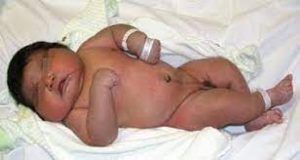Macrosomia:

A mother in Brazil gave birth to a two-foot-tall baby weighing 16lb (7.3kg)
- Macrosomia term used to describe giant babies is macrosomia (Greek for the large body). Any baby that weighs more than 4kg, regardless of its gestational age, is said to have macrosomia.
- Factors that cause Macrosomia:
- The mother’s body weight: Obese mothers are more likely to have children with Macrosomia.
- Mothers with gestational diabetes: High blood sugar that arises during pregnancy, this increases to between 15 per cent and 45 per cent of births.
- Being older when pregnant also increases the odds of having a baby with macrosomia.
- Overdue pregnancies: Those that run past the typical 40 weeks – also increase the risk of a baby being macrosomic, particularly at 42 weeks or more.
- Previous pregnancies increase the risk of macrosomia because, with each successive pregnancy, birth weight increases.
- Macrosomic baby may cause permanent harm to shoulders of a baby.
- While the baby is stuck, it cannot breathe and the umbilical cord may be squeezed.
- Mothers are also at increased risk of vaginal tears during delivery, which then increases the risk of postpartum haemorrhage (bleeding)




